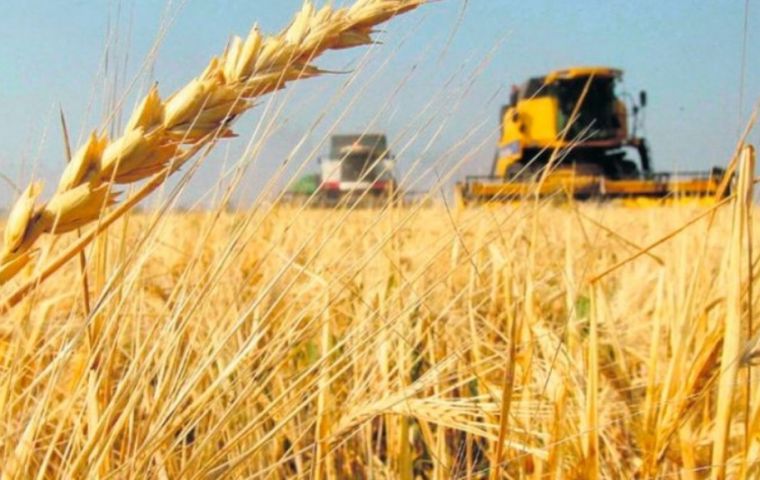MercoPress. South Atlantic News Agency
Brazil to become wheat self sufficient in five years, planting the grain in tropical areas
 This year Brazil is going to have an estimated demand of 13 million tons of wheat, but the country will only harvest 9 million tons
This year Brazil is going to have an estimated demand of 13 million tons of wheat, but the country will only harvest 9 million tons Brazil will become wheat self sufficient in five years time, according to Celso Luiz Moretti, head of EMBRAPA, the Brazilian agriculture surveys and research center, which has helped the country become one of the world's leading food producer and exporter.
“This year we are going to have an estimated demand of 13 million tons of wheat, but Brazil will only harvest 9 million tons. That means that at the current growth of the crop and the average of the last few years, it is most possible that Brazil becomes self sufficient in wheat production in five years”, the expert estimated.
He added, “since Brazil adopted wheat sowing not only in the Cerrado region, the country is now in a position to reach self sufficiency”. Cerrado is a vast tropical savanna eco-region of Brazil, particularly in the states of Goiás, Mato Grosso do Sul, Mato Grosso, Tocantins, Minas Gerais and the Federal District, equivalent to some 20% of South America's largest country.
Traditionally wheat grows in colder areas, such as southern Brazil, Argentina, Canada, United States, Russia and Ukraine. Wheat is one of the very few grains Brazil imports, mainly from Mercosur partner Argentina.
“We started working over forty years ago to find a wheat genetically adaptable to all weather in Brazil. In 2010 when we started bringing wheat from Cerrado, we begun to develop the adaptable varieties. And this grew in quite an interesting way, which even impressed other colleagues from the rest of the world, and who are experts in wheat growth in colder climates. So it was Embrapa which showed it was possible to sow and harvest wheat in tropical climates”, explained Celso Luiz Moretti.
World production of wheat is in the range of 779 million tons, FAO reports. But with the Russian invasion and war in Ukraine, responsible for 30% of global supply, prices started to increase, and with a hike in domestic production, Brazil can have improved capacity to provide for home consumption.
In related news Embrapa pointed out that one of its researchers, Mariangela Hungria, was included among the world's top agronomists in phyto-technology, the only representative from South America. She has specialized in developing technologies that increase productivity, improve quality and help guarantee agriculture and animal breeding sustainability.
The head of Embrapa recalled that research by Mariangela Hungria on biological fixing of nitrogen, helped Embrapa prove and develop such a technique.
“It was a technology we started to work on in the nineties. It's a bacteria which implanted next to the seeds in the soil, and since most of the air that surround us has nitrogen, the bacteria captures the nitrogen and delivers it to the soy plant. This significantly reduces the need to employ chemical fertilizer, which means that besides helping the Brazilian farmer to cut costs, we are also contributing to a reduction of greenhouse gases”
Finally Moretti said Brazil is advancing with the help of Embrapa to increase production more sustainably, with a digital agriculture, with the use of drones, sensors, internet, artificial intelligence, and the so called bio-revolution which is advancing in the genomic evolution of plants and animals for a higher and better production, resistant and adapted to climatic conditions and changes.
The Empresa Brasileira de Pesquisa Agropecuária (EMBRAPA) is a state-owned company affiliated with the Brazilian Ministry of Agriculture, devoted to pure and applied research on agriculture. Embrapa also maintains international cooperation projects in order to perfect knowledge of technical and scientific activities or to share knowledge and technology with other countries.




Top Comments
Disclaimer & comment rulesCommenting for this story is now closed.
If you have a Facebook account, become a fan and comment on our Facebook Page!